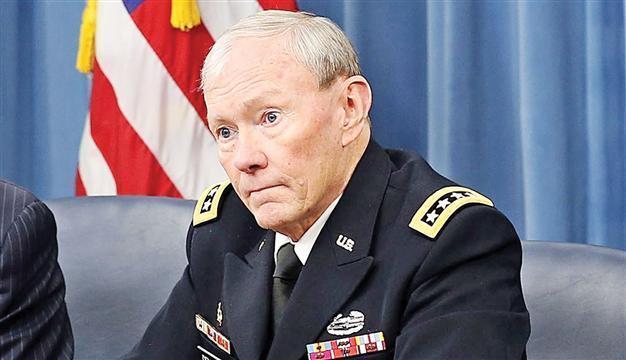Turkey has US ‘teams,’ not troops
WASHINGTON / ANKARA

Dempsey, US Chairman of the Joint Chiefs of Staff, speaks to reporters. AFP photo
Suggestions by top U.S. commanders that Washington has sent military personnel to Turkey to assist on a variety of issues, ranging from Syria to outlawed militants, should not be understood as a deployment of U.S. troops in Turkey, a senior Turkish diplomat has said.The U.S. has at times sent teams to Turkey to assist on the issues of humanitarian zones, ballistic missile systems and Turkey’s anti-terror fight, Martin Dempsey, U.S. Chairman of the Joint Chiefs of Staff, said Oct. 26.
Dempsey’s words came days after U.S. Army Europe Commander Lt. Gen. Mark Hertling said the U.S. Armed Forces had recently sent soldiers to Turkey and that the soldiers deployed in Turkey had been sharing intelligence, prompting the Turkish diplomat to deny suggestions that the move constituted a deployment of U.S. soldiers in the country.
Speaking during a press conference with Defense Secretary Leon Panetta, Dempsey said: “Adm. James Winnefeld, my vice chairman, just returned back from Turkey and had conversations with his counterpart about those things. We’ve been sharing intelligence with Turkey for five years, and one of the things we’re looking to do now is learn lessons, recognize a different situation on Turkey’s southeastern border and see if there’s other things we could do to assist them, as well as to reduce the threat of ballistic missile attack inside Turkey. So it’s a work in progress, and we go and come as we need to have those.” Dempsey also said Prime Minister Recep Tayyip Erdoğan was doing a good job in fighting terrorism. “This is Prime Minister Erdoğan’s country. I cannot judge his approach. And he is doing his job well.”
Dempsey made the comments following a question over Turkey’s refusal to heed a U.S. suggestion to conduct a “bin Laden-style” operation against the outlawed Kurdistan Workers’ Party (PKK).
“We offer to share our experience. And we benefit from [their] experience. Sometimes [they] accept our offers, and sometimes not. I do not conclude [from this that there is] any communication gap,” Dempsey said.
















